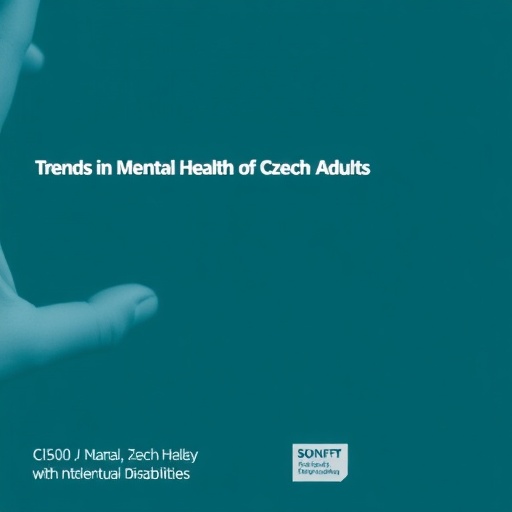In an unprecedented extensive study spanning over a decade, researchers have meticulously charted the evolving landscape of mental illness, challenging behaviours, and psychotropic medication use among adults with intellectual disabilities in the Czech Republic. This landmark research, recently published in BMC Psychiatry, provides critical insights into how these factors intertwine and change over time, underscoring the complexities of managing health care in this vulnerable population.
The study harnessed a vast dataset from the Institute of Health Information and Statistics of the Czech Republic, encompassing over 62,000 adults diagnosed with intellectual disabilities and accumulating more than 700,000 person-years of clinical data between 2010 and 2022. This population-wide approach allowed for a comprehensive analysis of trends in mental health diagnoses, behavioural challenges, and medication prescribing patterns across a significant temporal spectrum.
Initial findings revealed that in 2010, approximately 15.7% of this cohort were diagnosed with concomitant mental illness, which modestly increased to 17.3% by 2022. Challenging behaviours, which pose considerable difficulties in care management, were present in nearly 29% of individuals initially and rose to 30.5% by the end of the study period. Also notably, psychotropic medication prescriptions were widespread, affecting over half of the population at 55% in 2010 and escalating to 59% in 2022. These figures suggest a steady, if incremental, rise in both diagnosis and pharmacological intervention over the twelve years under review.
Delving deeper into mental illness subcategories, the overall prevalence remained relatively stable, with intriguing exceptions. Anxiety disorders and neurodevelopmental conditions, including autism spectrum disorder and attention-deficit hyperactivity disorder (ADHD), experienced significant surges in prevalence. This observation points toward evolving diagnostic practices, increased awareness, or perhaps shifts in underlying risk factors affecting this subgroup within the intellectually disabled population.
Incidence rates of newly diagnosed mental illnesses and challenging behaviours painted a different picture. Between 2015 and 2022, most categories showed a decline in new diagnoses, contradicting the trends in prevalence. However, the neurodevelopmental disorders bucked this trend, with incidence markedly climbing, emphasizing a growing recognition and possibly earlier detection of these specific conditions among adults with intellectual disabilities.
A particularly revealing aspect of the study is the correlation found between the incidence of challenging behaviours and certain psychiatric conditions, including psychoses, bipolar disorder, and anxiety disorders. This evidence lends weight to the hypothesis that behavioural difficulties may be manifestations or consequences of underlying mental health disorders, advocating for integrated approaches in diagnosis and treatment.
Crucially, the prevalence of psychotropic medication closely mirrored the rates of both mental illness and challenging behaviours, underscoring the heavy reliance on pharmacological strategies to manage these complex clinical presentations. However, the data raises concerns regarding the appropriateness of some prescriptions. Among individuals prescribed antipsychotics, only a minority—about 18% in 2010 and 19% in 2022—were diagnosed with severe mental illnesses such as psychoses or bipolar disorder, which are formally approved indications for long-term antipsychotic use.
The study further highlights prescription patterns within the subgroup exhibiting challenging behaviours. Here, psychotropic medications were heavily utilized: in 2010, 82% received such medications, including 62% on antipsychotics, 20% on antidepressants, and 17% on anxiolytics. Over time, incidence rates for new prescriptions of any psychotropic, antipsychotics, antidepressants, and anxiolytics declined among this group. Paradoxically, prescriptions for mood stabilisers and particularly hypnotics or sedatives increased significantly, sparking questions about shifts in clinical practice and the appropriateness of sedation-focused strategies.
These findings carry profound implications for healthcare providers and policymakers. The increased use of hypnotics and sedatives suggests a trend towards chemical restraint practices, potentially substituting for behavioural interventions. Such approaches raise ethical and safety concerns, especially given the vulnerability of adults with intellectual disabilities to side effects and the long-term consequences of polypharmacy.
The study’s comprehensive data underscore the urgent need for balanced, evidence-based treatment protocols that prioritize accurate diagnosis, non-pharmacological interventions, and cautious use of medications. These measures could reduce the risk of overmedication while addressing the intricacies of co-occurring mental health conditions and behavioural challenges.
Moreover, the research contributes to a growing body of literature advocating for improved mental health services tailored to adults with intellectual disabilities, highlighting disparities and emphasizing a more person-centered approach to care. Enhanced training, multidisciplinary collaboration, and ongoing population surveillance emerge as pivotal components to optimize outcomes.
In sum, this pioneering population-based cohort study not only delineates the trajectory of mental health and medication practices over an extensive period but also serves as a clarion call to re-examine treatment paradigms. Efforts to align clinical management with established guidelines while recognizing the unique needs of this demographic are paramount to advancing equitable and effective healthcare.
Subject of Research: Adults with intellectual disabilities in the Czech Republic, focusing on the prevalence and incidence of mental illnesses, challenging behaviours, and psychotropic medication prescribing from 2010 to 2022.
Article Title: A whole population-based cohort study of the trajectory of the prevalence and the incidence of mental illness, challenging behaviour, and psychotropic medication prescribing in adults with intellectual disabilities in the Czech Republic between 2010 and 2022.
Article References:
Deb, S., Jarkovský, J., Melicharová, H. et al. A whole population-based cohort study of the trajectory of the prevalence and the incidence of mental illness, challenging behaviour, and psychotropic medication prescribing in adults with intellectual disabilities in the Czech Republic between 2010 and 2022. BMC Psychiatry (2025). https://doi.org/10.1186/s12888-025-07620-7
Image Credits: AI Generated
DOI: https://doi.org/10.1186/s12888-025-07620-7




